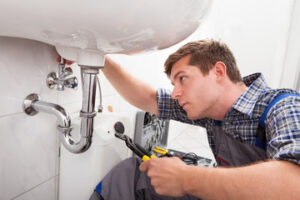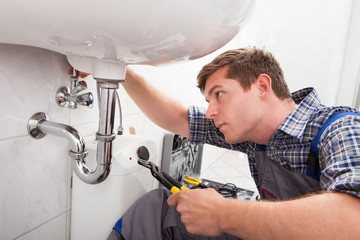Plumber Woodland Hills are essential in keeping our water supplies, toilets, and appliances functional. This can be a challenging yet rewarding career path for people who like working with their hands, solving problems, and providing valuable services to the community.
Plumbers must be able to think critically and solve complex problems efficiently. They also need strong communication skills to interact with customers. Other essential qualities include physical stamina, strength, and manual dexterity.
Plumbing systems are complex, interconnected networks that supply water, carry waste away, and regulate indoor climate. Plumbers install these systems in new buildings and repair or replace them when they are damaged. They must have a thorough understanding of how the pipes, fixtures and appliances work together to ensure that the system functions properly. Plumbers must also be able to read blueprints and understand the building codes and regulations that apply to plumbing. Many plumbers learn their trade through a formal apprenticeship, but some enter the profession after completing a bachelor’s degree program in engineering or a related field.
A plumber must be able to assess the condition of existing plumbing systems and determine whether they need repairs or replacements. They must also be able to install the necessary parts and accessories, including valves, connectors, and fittings. Plumbers are sometimes required to remove existing fixtures, such as bathtubs or sinks, to inspect and repair the plumbing underneath. This can require the use of power tools to cut through drywall and other surfaces.
Before installing any new plumbing, plumbers must lay pipe sections through walls and floors. They must take accurate measurements and follow the building codes to ensure that the piping is sized correctly. The plumber then connects the piping to fixtures and appliances, such as sinks, toilets, and showers. After connecting the piping, plumbers test the system to ensure that there are no leaks and that all connections are secure.
Some plumbers specialize in commercial or industrial plumbing, which often involves larger-scale piping networks and more complicated fixtures and appliances. In these types of jobs, plumbers must be able to work with engineers and architects to design the entire plumbing system before construction begins. They may also be responsible for ensuring that all plumbing meets local codes and regulations.
A plumber must be able to communicate effectively with clients to understand their needs and provide advice and recommendations. This can involve explaining the cost of plumbing services and negotiating with customers when necessary. Some plumbers also work on emergency calls, repairing broken toilets or fixing clogged drains as needed.
Repair
Whether it’s a dripping faucet or an overflowing toilet, most plumbing issues have easy solutions that homeowners can handle on their own. However, some problems are more serious and require the expertise of a plumber. Even the most competent DIYer can run into trouble when dealing with main line plumbing and drain line plumbing. These issues can cause severe water damage to your home if not addressed immediately.
Behind your walls and beneath your floors, there is a complex network of pipes that carry waste and freshwater to and from your house. This system includes your sewer main line, which runs from the house to the city sewer line, and your drain lines, which run throughout the interior of your home. When these lines get clogged or damaged, it can affect your entire house. Fortunately, there are plumbers who specialize in main line and drain line repair.
These plumbers have the skills and equipment to repair large-scale plumbing systems in industrial settings. They also work on plumbing fixtures and equipment in hospitals, schools, hotels, and other commercial properties. Industrial plumbers are specially trained to deal with high-pressure pipes and other specialized equipment.
Some common residential plumbing repairs involve leaks, clogs, and water heater problems. A plumber can fix a leaking faucet or toilet, replace a water heater, or install a new shower head or garbage disposal. They can also fix or replace faulty electrical wiring in old or outdated homes.
One of the most important jobs of a plumber is to inspect and maintain plumbing systems. These professionals can detect small problems before they become bigger ones by checking for rust, corrosion, or water spots on pipe surfaces. They can also check for clogged drains and sewer lines, which may be caused by tree roots or other debris.
Most of us have dealt with a clogged drain or toilet at some point. A clog can be very frustrating, especially when it happens in the middle of the night or on a weekend. But did you know that there are ways to avoid these clogs altogether? Here are some tips from a professional plumber to keep your drains and toilets clog-free:
Maintenance
Plumbing systems are essential to the comfort and functionality of a home or building. They allow for the distribution of water and gas, and the removal of wastes, and a plumber’s job is to ensure that these systems are working properly at all times. This can include repairing leaks, cleaning drain lines, and installing new fixtures like toilets and shower heads. Keeping up with regular maintenance and inspections can help prevent expensive repairs in the future.
Plumbers work in a variety of settings, from residential homes to large commercial and industrial buildings. They must be able to adapt to each environment and work with different types of materials. They also need to have strong customer service skills in order to communicate with clients about their plumbing needs and provide advice and recommendations.
A plumber’s duties may also include the installation of gas lines. These are necessary for the operation of appliances such as stoves and furnaces, and must be installed by a licensed professional. Plumbers who specialize in gas line installation often have additional training and certification requirements.
A plumbing system also includes a drinking supply line, which is necessary for providing clean, potable water to all occupants of a building. Regular maintenance and inspections from plumbers are essential for this line to function correctly, and to ensure that it does not become contaminated with sewage or other contaminants.
Inspection
As part of their duties, plumbers must inspect plumbing systems to ensure that they are functioning properly and meet building codes. This involves using specialized equipment like video cameras and pressure gauges to check for problems such as leaks or blockages. It also includes examining blueprints and plans for new construction projects to make sure that the plumbing infrastructure is designed correctly.
Plumbing is vital to our everyday lives, so it’s important that the system works correctly. If a problem arises, it’s essential to find a professional plumber who can repair it quickly and effectively.
A licensed plumber will have the skills and training to perform a wide range of tasks, from installing pipes and fixtures to repairing leaks and broken appliances. These professionals should be able to work well with customers and provide quality customer service. They should also be knowledgeable about the latest technologies and trends in the plumbing industry.
One of the most common duties of a plumber is to install plumbing in new construction projects. This can include laying pipes, installing toilets and faucets, and hooking up appliances such as dishwashers and washing machines. Construction plumbers often work with architects and builders to design the plumbing system for the project. They must be able to read and interpret blueprints and plans in order to understand the specifications for the pipe layouts and fixture locations.
Another major responsibility of a plumber is to maintain existing plumbing systems. This can include replacing worn parts, fixing leaks, and performing routine cleaning. It also includes installing and repairing water heaters and garbage disposals. Plumbing maintenance is an important aspect of keeping a home or business safe and functional, and it’s essential for homeowners to keep up with regular inspections and preventive maintenance.
While some people try to save money by hiring unlicensed “Chuck in a Truck” plumbers, this can lead to disastrous results. These individuals may not have the proper training or experience to handle complex jobs, and they may not be bonded or insured. In addition, they can cause damage to your property if they incorrectly complete a job.
